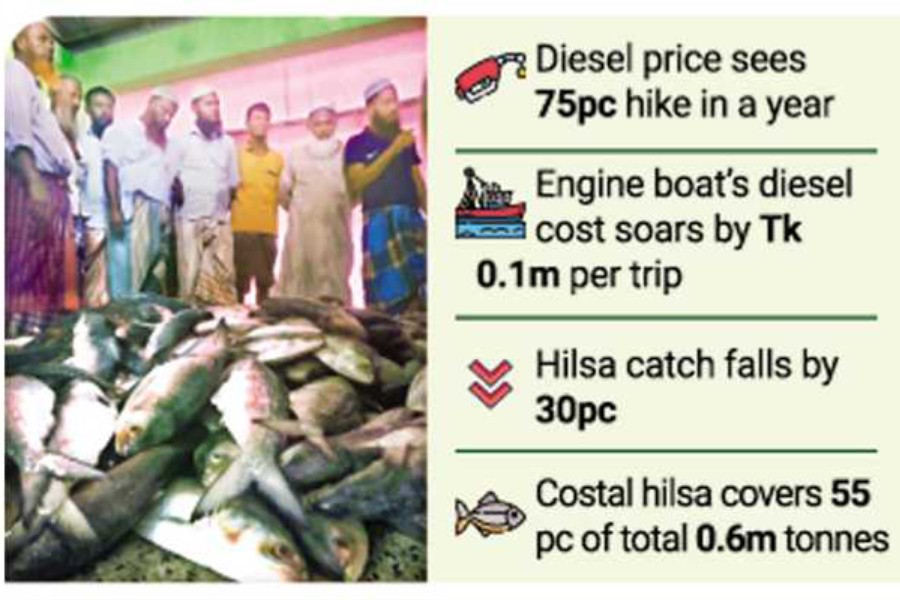
Published :
Updated :

Diesel price hike, low hilsa catch and the turbulent sea are taking a heavy toll on the trade, thus hurting both the fishing community and consumers.
Prices of the delicious silvery fish this peak monsoon are 15-20 per cent higher amid the fuel price hike and a low haul in rivers and in the bay.
Fishermen and traders in Cox's Bazar, Patuakhali and Chandpur districts have made the observations.
Hilsa retailed at Tk 750-1,700 a kg depending on size and quality in Dhaka, Chattogram and Narayanganj metropolitans on Friday, according to market sources.
The prices in fishing regions like Cox's Bazar, Patuakhali, Barguna, Barisal and Chandpur are also much higher at Tk 26,000-54,000 a mound (40 kg).
"Price rises have heightened losses amid a low catch," fisherman Abdul Gafur told the FE during a recent visit to Kuakata of Kalapara upazila in Patuakhali.
"Although the fishing ban was lifted on July 23, we could hardly make a single trip to the rough sea."
"During the seven-day trip," Mr Gafur said, "our 16-member team earned only Tk 2,400 each amid getting a tiny volume of small-sized hilsa."
Half of the amount he earned went to pay loan he took during the fishing ban period.
Sharif, a fisherman from Moheshkhali, Cox's Bazar, says he works on a medium-sized engine-run 'barshi boat' that catches fish through thousands of hooks.
Leaving aside operating costs for diesel and food, the rest of the fish is divided into 45 portions and 15-16 of fishermen get 19 shares, the boat owner 20 and boatmen and his assistant six shares.
"We got only 13 maunds of fish in the trip against the expected 25 maunds," he said.
More than nine mounds of fish were counted as the operating costs worth Tk 01.3 million invested by the boat owner.
"The rest four mounds were divided among us. Each fisherman got fish 6.0 kg of fish worth Tk 2,300 from the seven-day trip."
Mr Sharif says monsoon fishing is gradually declining despite the fact that fishing remains stopped for more than two months in the beginning of the season.
"We have no idea why this is happening," he adds.
Inty Fish Wholesale proprietor Al Amin Hawladar at Alipur Bazar in Patuakhali said fish supply was good in the last week of July which dropped from the beginning of August.
The latest stormy days in the sea have stopped fishing totally, he told the FE.
He said small-sized hilsa was auctioning at Tk 26,000-28,000 a maund and big-sized at Tk 52,000-54,000.
Kamal Uddin, a engine-run hilsa boat owner, says the number of stormy days has been increasing in the bay for the past two decades.
Normally, heavy storms are felt for 25-30 days earlier which has increased to 35-40 days a year.
He said hilsa haul has also been declining in the monsoon but rising in the winter in the bay.
He said diesel cost has increased by 75 per cent in the last one year amid a twice hike between November of last year and August of this year.
Ten-twelve days' trip cost was Tk 130,000 which has increased to Tk 225,000, including food and 2,000 litres of diesel for 16-17 persons for 10 days.
Cox's Bazar Fishing Boat Owners Association president Mujibur Rahman says fishing is yet to start in full swing after the ban amid the turbulent sea.
Price is good, but low catch and surge in diesel price have been hurting both workers and owners, he adds.
Mr Rahman further says that fish prices will remain higher across the year for the diesel price hike.
Kalapara senior fisheries officer Apu Saha told the FE that low rain might impact hilsa fishing in rivers and the bay this year.
Hilsa production in Patuakhali district is more than 80,000 tonnes, with Kalapara covering 35,000 tonnes.
The official predicts that production may rise after the low over the bay ends.
RISING HILSA PRICES
Hilsa now sells at Tk 750-1,700 a kg in Dhaka's retail markets-a 10-per cent hike in a week.
The period between July and September is the peak fishing season for hilsa.
Rayerbazar fish vendor Sarowar tells the FE that hilsa price has been increasing despite the beginning of fishing in the bay after a two-month ban.
Aynal Hossain, a Jatrabari trader, says prices are much high in Mawa and Chandpur fish markets amid low catches in the Padma and Meghna rivers.
Big-sized hilsa (above 1,000 kg) sells at Tk 56,000-57,000 a maund at Mawa, medium ones at Tk 40,000-45,000, small ones at Tk 30,000-32,000, he adds.
Chandpur Fisheries Traders Cooperative Association president Abdul Bari Jamadar says hilsa supply from the river has been much lower for the past two years amid low monsoon rain.
"We're now depending heavily on marine hilsa from Barishal, Barguna and Cox's Bazar, although hilsa haul has also declined there."
Mr Jamadar expects a rise in hilsa catch in rivers with the beginning of heavy monsoon rainfall.
According to fisheries department, hilsa output was 0.6-million tonnes last fiscal.
Hilsa comprises 12 per cent of the total fish the country produces and its contribution to the gross domestic product is more than 1.0 per cent.
tonmoy.wardad@gmail.com


 For all latest news, follow The Financial Express Google News channel.
For all latest news, follow The Financial Express Google News channel.